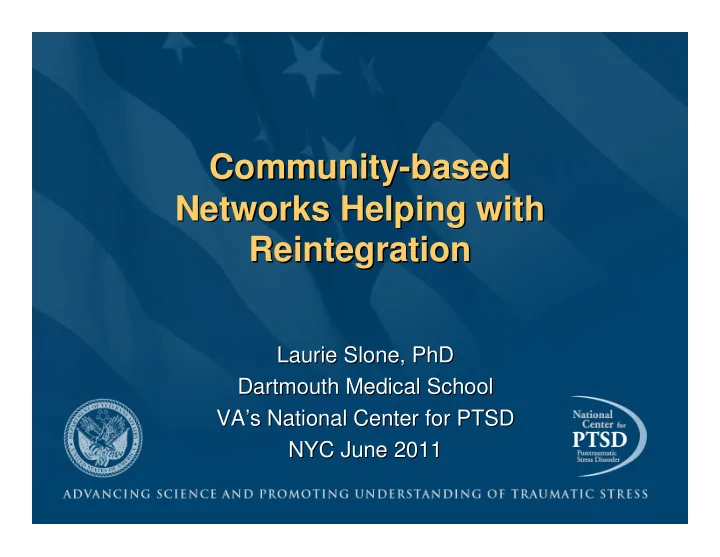

Community- -based based Community Networks Helping with Networks Helping with Reintegration Reintegration Laurie Slone, PhD Laurie Slone, PhD Dartmouth Medical School Dartmouth Medical School VA’ ’s National Center for PTSD s National Center for PTSD VA NYC June 2011 NYC June 2011
June 27 th PTSD Awareness Day www.ptsd.va.gov
Vermont Military, Family & Vermont Military, Family & Community Network Community Network 2005- -2011 2011 2005
What is the MFCN? A community effort to understand, prevent & help deal with the effects of war on service members, their families & communities. Together we raise awareness about: • Challenges faced by service members and families • Resources in place to help them as needed • How we can help connect service members and their families to their communities
Structure of the Network An entire Network across the state that wants to help veterans and their families Regional Taskforce: • Overall planning group to develop and assess goals and objectives: Meets monthly/quarterly • Subcommittees targeting specific topics Six Local Taskforces: • Military and Civilian liaisons • Increase awareness of the needs and resources • Identify gaps and work with Regional Taskforce to resolve issues
Lyndonville/Newport /St. Johnsbury Swanton/St. Albans /Morrisville Berlin/Barre/ Hartford Burlington TASKFORCE /Middlebury Objectives and Policy Development Brattleboro /Springfield Rutland Military, Family & Community /Bennington Network Structure
History of the MFCN 2005 1 st conference: best part NETWORKING • Two follow up events, by request • Family events in north to prep for return of Taskforce Saber • MFCN born • First statewide event: AHS joined • Realized less about creation of resources, more • about breaking down silos
Accomplishments • Provide information to service members and their families, using the network • Training events for community-based providers: No wrong door • The Vermont Yellow Book: Resources for Service Members and their families • Partnered with VT 2-1-1 • After the War Zone: A Practical Guide for Troops and Families
Accomplishments cont. • Website www.vtmfcn.org • Email list for monthly notices all- subscribe@vtmfcn.org • Calendar of events and trainings • Regular MFCN sponsored statewide events to increase awareness (Camp Johnson, Brattleboro, WRJ, Newport) • Four Corners
Four Corners • Financial • Jobs and Education • Health • Reintegration: Family and Peer Support
Network Members VT National Guard: • Invest EAP • VT 211 • Family Program • Family Programs VT Traumatic Brain • (FRGs, FACs), Injury Center • TriCare/HealthNet Child & Youth VT Medical Sleep • Program, • Police Dept. Disorders Center Chaplains • Center on Disability NAMI - VT • VA, Vet Centers • • VT Dept of Labor ESGR • Governor • • State Dept VA SBA’s • Legislative reps • • Colleges Religious leaders • Agency of Human • Services Drs., counselors, • Schools/teachers • case managers, VT Dept of Health • • VSOs practitioners, nurses State Guard • • Vet to Vet Program ….and many more….
Important Elements • Proactive Strategy • Sustainable, using existing systems • Keep an open mind and keep learning • Military, State, VA, and Community • Just talk to one another & play nice • Meet regularly • Don’t give up
DoD Funded Research • Creation of a similar network in Maine • Pre and post measures of awareness (needs and services) and collaboration in community providers • 18 month time frame for grant
Maine Military & Community Network
www.MaineMCN.org • Regional focus • Some funding (instead of none) • Control condition: MA • Preliminary data analyses: • Maine increased in awareness and collaboration over time • Mass. remained the same
10 Ways Community Members Can Help 1. Be aware of resources and services 2. Understand that everyone is affected when troops are deployed 3. Remember children 4. Learn about the experiences of war & readjustment to home life during and following deployment 5. Learn more on an ongoing basis
10 Ways Community Members Can Help cont. 6. Understand identification/treatments if you are a doctor, clinician, or social worker 7. Ask. But do not push if someone is not ready to discuss things 8. Realize the stigma regarding mental health issues and that getting people to seek help is not easy 9. Know some facts 10. Spread the word. Join a Community Network www.vtmfcn.org www.mainemcn.org
Recommend
More recommend